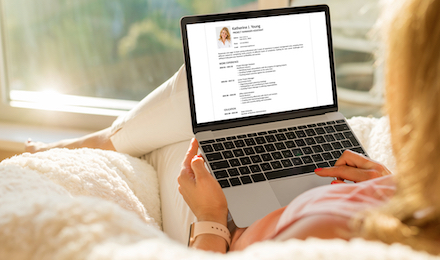So you’ve got an important job interview coming up and you’re wondering—what do I do now? Preparing for a meeting with a potential employer takes planning and research, both before and after the interview.
Below we’ve compiled 12 tips you might not have thought of.
Before:
- Do your research
There is plenty of content to be found about any company prior to an interview. Big firms publish quarterly reports and earning calls, and even smaller startups likely have a web site or blog.
If you’re asked “What’s our biggest opportunity we need to take advantage of,” a strong reply would be something along the lines of, “I was listening to your quarterly earnings call and was impressed to learn marketing has an ROI of $4 million…”
- Take advantage of Google Alerts
Make sure to stay informed on the company you’re interviewing with via Google Alerts. Visit google.com/alerts, type in the name of the business, and enter your email address to receive news on the business straight to your inbox.
- Keep your social media clean
A large majority of employers today check potential employees’ social media accounts before making a formal job offer. Prior to the interview, go through Facebook and Twitter and take down anything objectionable. Better yet, use a program like Social Sweepster to help clean up your accounts in no time.
- Make your appointment for an ideal time
Believe it or not, there is a good time to set up an interview. You don’t want to go in on a Monday or Friday, days that can be eaten up by the weekend. And you don’t want to get there first thing in the morning, when phone calls and emails are being returned. Shoot for a Tuesday or Wednesday around 10:30 or 11 am for the perfect timing.
- Get your story straight
At some point, the interviewer is likely to say, “So, tell me about yourself.” At this juncture it would be easy to give a formatted answer of where you grew up, where you studied, etc. But aim to break out of this box. Talk about your influences, what made you get into this field, what inspires you. These are things an employer is likely to remember.
- Dress for success
It can’t be overstated that a first impression makes a big impact, and often that first impression is based off what an individual is wearing. When going in for an interview, put your best foot forward with clean, well-kept clothing that is professional and modest. It is better to be over dressed than under dressed, so make sure to keep it classy.
- Have an answer for the hard question
“What’s your biggest weakness” is a fairly common question, so you need to be ready to answer it effectively. It’s possible to frame your response in a way that actually works in your favor. Instead of stating, “I have trouble with time management,” instead say, “I have trouble with time management, but here is how I have worked to improve upon that…”
- Have some problem solving stories
It’s key that you’re able to talk easily about a time you were confronted with a work problem, how you made a plan of action to correct it, and how it was resolved. Take some time to brainstorm such an example, so you have it at the ready if prompted in the interview.
During:
- Don’t be afraid to talk out loud
Expressing your thoughts can provide insight into how your mind works, so don’t hesitate to process your thoughts as you work out solutions. For example, if you were asked, “How would you calculate budget costs,” don’t think silently then announce an answer after a minute of thinking. Work out how you would come to a solution out loud so the employer sees your thought process.
- Ask productive questions
Of course it’s always a good idea to ask an interviewer astute questions, but it’s also possible to ask questions that do double duty. When it comes time, aim to present queries that both pose a question and reveal something new about yourself to the interviewer. For example, instead of,” Are there opportunities to incorporate new markets into the role?” ask, “I am very interested in foreign languages. Is that something I can fold into my work?”
- Ask something forward
At the conclusion of the interview, a truly confident interviewee will ask, “Is there anything you are unsure of about me that I can help clear up?” Asking something so direct shows you aren’t afraid of answering for you actions, and shows you are ready to respond to whatever comes your way. It also displays your commitment to securing the job.
After:
- Send a thank you
Whatever else happens in the interview, always make sure to send a follow up thank you afterward. You can send an email or a note through the mail, but make sure to thank the interviewers for their time, reiterate your interest and capability for the job, and let them know they can call you with any questions.





